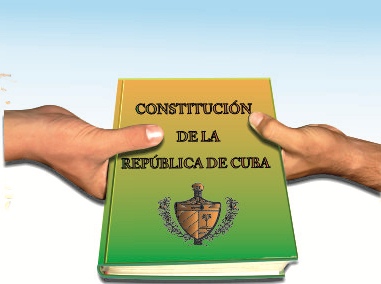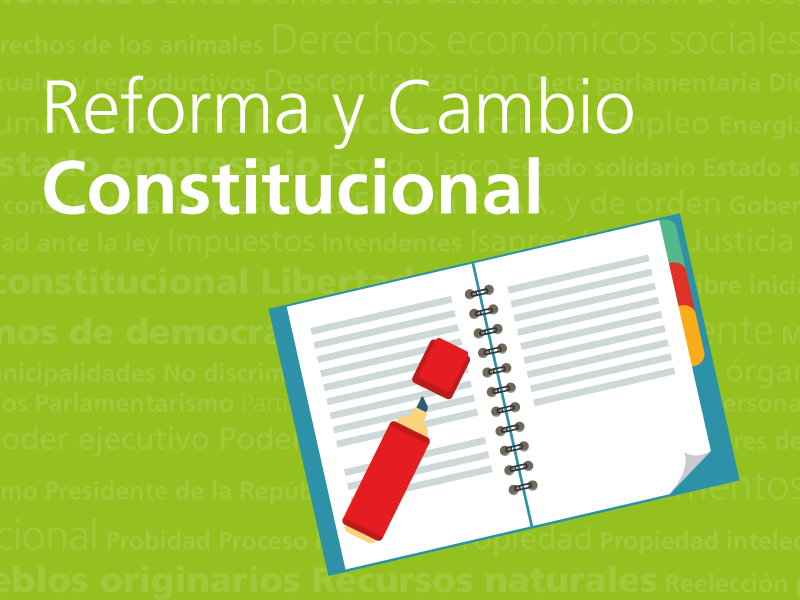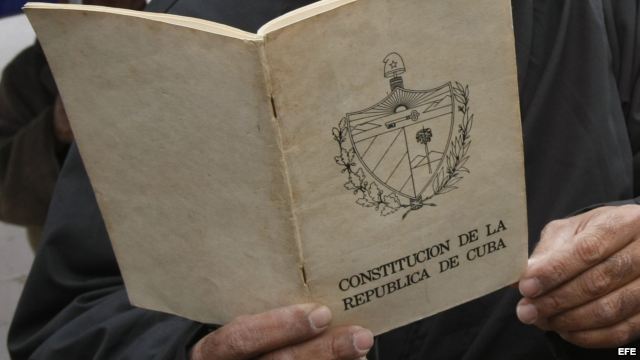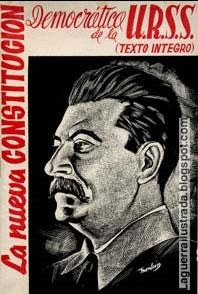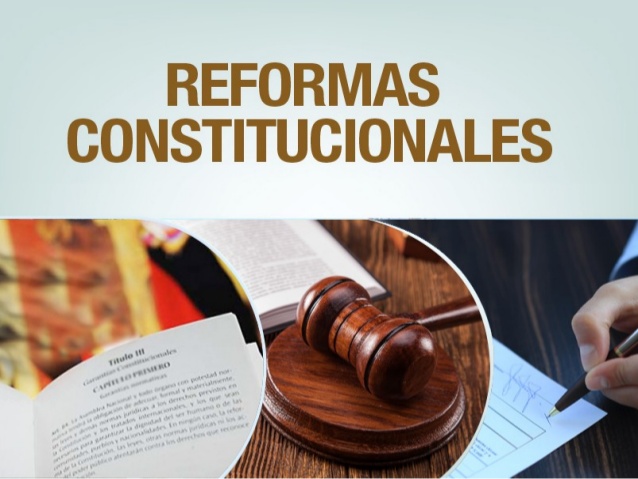According to the Cuban historian Rafael Rojas in his new book ‘The constitutional change in Cuba’ that he unveiled on Wednesday at the Casa de América in Madrid, Spain.
The “increasingly growing” gap between social change and the Cuban constitutional regime makes it increasingly necessary a “total reform” of the constitution, which adapts to the new reality of the island and provides a legal basis for its integration into the global market, according to the Cuban historian.
In an interview with Efe in Madrid, Rojas said on Wednesday that the current Cuban constitutional text, which has governed since 1976 and with partial reforms in 1992 and 2002, has been “completely obsolete”, both in the reality of today’s world and in the of the Island, in the framework of comparison of the Latin American left “that has lived in recent years a remarkable renovation”.
That is the central axis of the book The Constitutional Change in Cuba, which the historian has written together with Velia Cecilia Bobes and Armando Chaguaceda and that was presented at the Casa de América in the Spanish capital.
Cuban constitutionalism is still contracting the largest debt with the Soviet constitutional model, “specifically with the Stalinist model of 1936.” The work reviews, through different aspects, the different stages of Cuban constitutionalism that, “unrelated to the renewal” of Other texts on the left of Latin America, still continues to contract the largest debt with the Soviet constitutional model, “specifically with the Stalinist model of 1936,” he added.
Changes needed .
Although in 1992 the Cuban constitution was adapted to the international situation, marked by the fall of the Berlin Wall and the disintegration of the USSR, they were simply “small changes in the discourse,” he stressed.
However, he affirmed that “they did not really credit the process of social change that was already beginning to take place in the 1990s but that has accelerated a lot in the last decades and specifically in recent years as a result of the impact of the reforms of the government of Raúl Castro , specifically between the years 2012 and 2015 “.
Among those reforms, Rojas highlighted the multiplication of self-employment, the incorporation into the non-state sector of almost two million Cubans, “not to mention the increase in contact between the island’s citizens and the growing Cuban migratory community”, encouraged for the restoration of relations with the United States and the normalization of relations with the European Union (EU).
For Rojas, the next relay at the top of the regime can propitiate a scenario favorable to a constitutional reform
According to the historian, for some time now, the most immobile sectors of the Cuban Government have conveyed the idea that, in constitutional terms, everything can take place gradually or very slowly from the point of view of partial reforms.
In that sense, for Rojas, the next relay in the leadership of the regime can propitiate a scenario favorable to a constitutional reform.
“What we can observe in the last year is that there has been a deliberate postponement of the issuance of new laws.” At first, it was thought – and all this is very subordinate to the relationship with the United States – that before the succession it would be issued in the National Assembly a series of laws, such as associations, the media, a new electoral law, among others, “said the expert.
“But this entire legislative package,” Rojas went on, “was deliberately postponed and also what Raúl Castro had announced about the constitutional translation of the reforms implemented between 2012 and 2015. Everything has been postponed for the new legislature and under the new presidency of the Council of State and Ministers “.
New Country Leadership .
In the historian’s opinion, once Raúl Castro leaves office in February 2018, “continuity will predominate, but at the same time the demands and expectations of change will be directed more clearly towards the new president, especially if is Miguel Díaz-Canel -current vice president- who is a civilian politician of the new generation “.
“Continuity will predominate, but at the same time the demands and expectations of change will be directed more clearly towards the new president, who is a civilian politician of the new generation”
“In these days the official messages of the leaders of the national electoral council and Diaz-Canel himself insist on the increase of young people and women in the National Assembly, that is, they are seeking to send messages about the renewal of the legislative body” , He said.
“If that is the tone, the expectations of reform, constitutional update, will concentrate on the figure of the president and the most immobile logic will continue to be associated with Raúl Castro, who would remain as first secretary of the Cuban Communist Party,” he added, although He was prudent in his predictions because in Cuba “you can never be sure of anything,” he said.
(OPINIÓN) CUBA NECESITA “UNA REFORMA TOTAL DE SU CONSTITUCIÓN”.
Según el historiador cubano Rafael Rojas en su nuevo libro ‘El cambio constitucional en Cuba’ que dio a conocer este miércoles en la Casa de América de Madrid, España.
La brecha “cada vez más creciente” entre el cambio social y el régimen constitucional cubano hace cada vez más necesaria una “reforma total” de la constitución, que se adapte a la nueva realidad de la Isla y aporte una base jurídica para su integración en el mercado global, según dijo el historiador cubano.
En una entrevista con Efe en Madrid, Rojas aseguró este miércoles que el actual texto constitucional cubano, que rige desde 1976 y con reformas parciales en 1992 y 2002, se ha quedado “completamente obsoleto”, tanto en la realidad del mundo actual como en la de la Isla, en el marco de comparación de la izquierda latinoamericana “que ha vivido en los últimos años una renovación notable”.
Ese es el eje central de libro El cambio constitucional en Cuba, que el historiador ha escrito junto a Velia Cecilia Bobes y Armando Chaguaceda y que fue presentado en la Casa de América de la capital española.
El constitucionalismo cubano todavía sigue contrayendo la mayor deuda con el modelo constitucional soviético, “específicamente con el modelo estalinista de 1936”.La obra repasa, a través de diferentes vertientes, las distintas etapas del constitucionalismo cubano que, “ajeno a la renovación” de otros textos de la izquierda de América Latina, todavía sigue contrayendo la mayor deuda con el modelo constitucional soviético, “específicamente con el modelo estalinista de 1936”, añadió.
Cambios necesarios.
A pesar de que en 1992 la constitución cubana se adaptó a la coyuntura internacional, marcada por la caída del muro de Berlín y la desintegración de la URSS, simplemente se trataron de “pequeños cambios en el discurso”, subrayó.
Sin embargo, afirmó que “no acreditaban realmente el proceso de cambio social que ya empezaba a vivirse en los 90 pero que se ha acelerado muchísimo en las últimas décadas y específicamente en los últimos años como consecuencia del impacto de las reformas del gobierno de Raúl Castro, concretamente entre los años 2012 y 2015”.
Entre esas reformas, Rojas destacó la multiplicación del trabajo por cuenta propia, la incorporación al sector no estatal de casi dos millones de cubanos, “por no hablar del incremento del contacto entre la ciudadanía de la Isla y la creciente comunidad migratoria cubana”, incentivada por el restablecimiento de relaciones con Estados Unidos y la normalización en las relaciones con la Unión Europea (UE).
Para Rojas, el próximo relevo en la cúpula del régimen puede propiciar un escenario favorable a una reforma constitucional
Según el historiador, desde hace ya un tiempo, los sectores más inmovilistas del Gobierno cubano transmiten la idea de que en términos constitucionales todo puede producirse de manera paulatina o muy lento desde el punto de vista de reformas parciales.
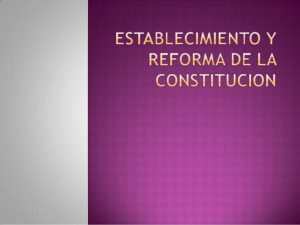
En ese sentido, para Rojas, el próximo relevo en la cúpula del régimen puede propiciar un escenario favorable a una reforma constitucional.
“Lo que podemos observar en el último año es que ha habido una postergación deliberada de la emisión de nuevas leyes. Al principio se pensó -y todo esto está muy subordinado a la relación con EE UU- que antes de la sucesión se emitiría en la Asamblea Nacional una serie de leyes, como la de asociaciones, la de medios, una nueva ley electoral, entre otras”, señaló el experto.
“Pero todo ese paquete legislativo -prosiguió Rojas- se postergó deliberadamente y también lo que había anunciado Raúl Castro sobre la traducción constitucional de las reformas aplicadas entre el 2012 y el 2015. Todo se ha postergado para la nueva legislatura y bajo la nueva presidencia del Consejo de Estado y de Ministros”.
Nueva dirigencia del Pais.
En opinión del historiador, una vez que Raúl Castro abandone el poder, en febrero de 2018, “va predominar el continuismo, pero al mismo tiempo las demandas y las expectativas de cambio se van a dirigir más claramente hacia el nuevo presidente, sobre todo si es Miguel Díaz-Canel -actual vicepresidente- que es un político civil de la nueva generación”.
“Va predominar el continuismo, pero al mismo tiempo las demandas y las expectativas de cambio se van a dirigir más claramente hacia el nuevo presidente, que es un político civil de la nueva generación”
“En estos días los mensajes oficiales de los dirigentes del consejo nacional electoral y del propio Díaz-Canel insisten en el incremento de jóvenes y de mujeres en la Asamblea Nacional, o sea que están buscando mandar mensajes en torno a la renovación del cuerpo legislativo”, dijo.
“Si esa es la tónica, las espectativas de reforma, de actualización constitucional, se van a concentrar en la figura del presidente y la lógica más inmovilista seguirá asociándose a Raúl Castro, que quedaría como primer secretario del Partido Comunista Cubano”, añadió, aunque se mostró prudente en sus vaticinios ya que en Cuba “nunca se puede asegurar nada”, dijo.
Agencies/14ymedio, La Habana/Internet Photos/Arnoldo Varona/TheCubanHistory.com
THE CUBAN HISTORY, HOLLYWOOD.



